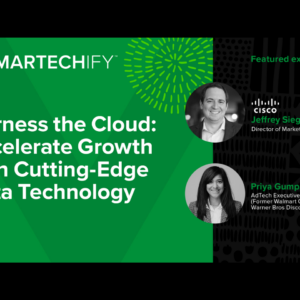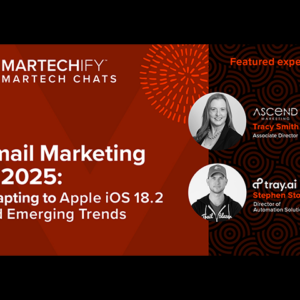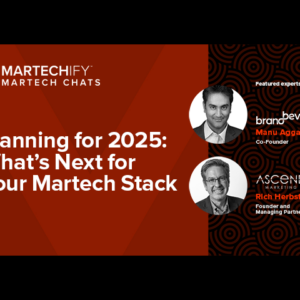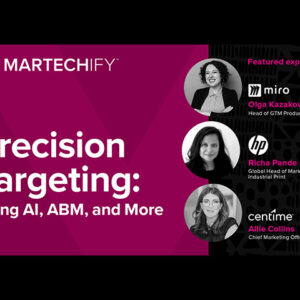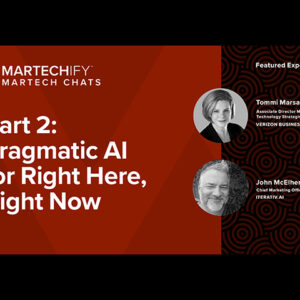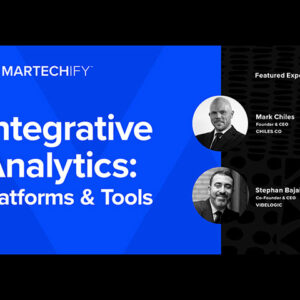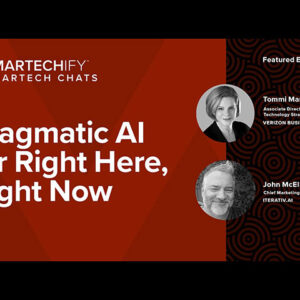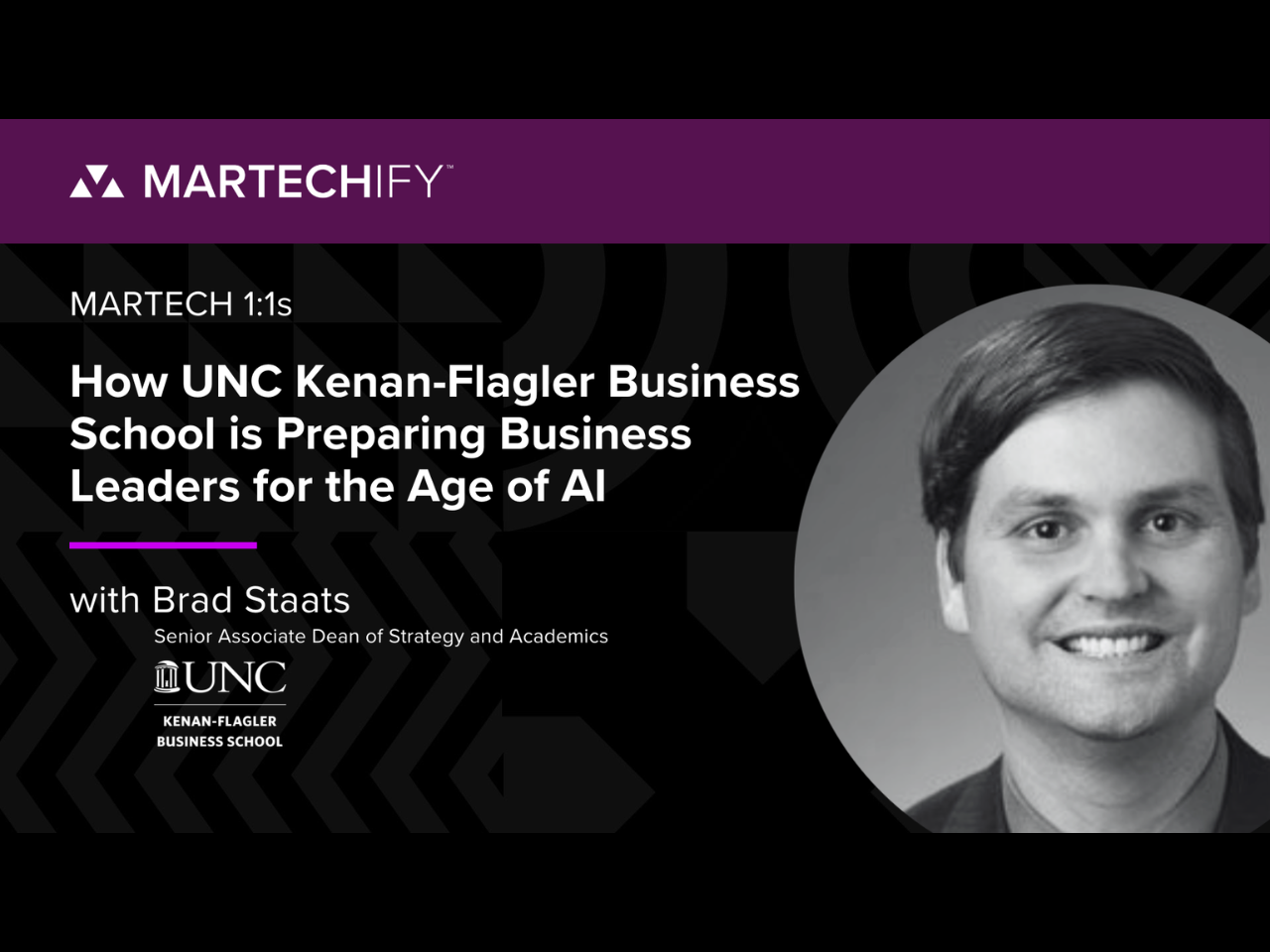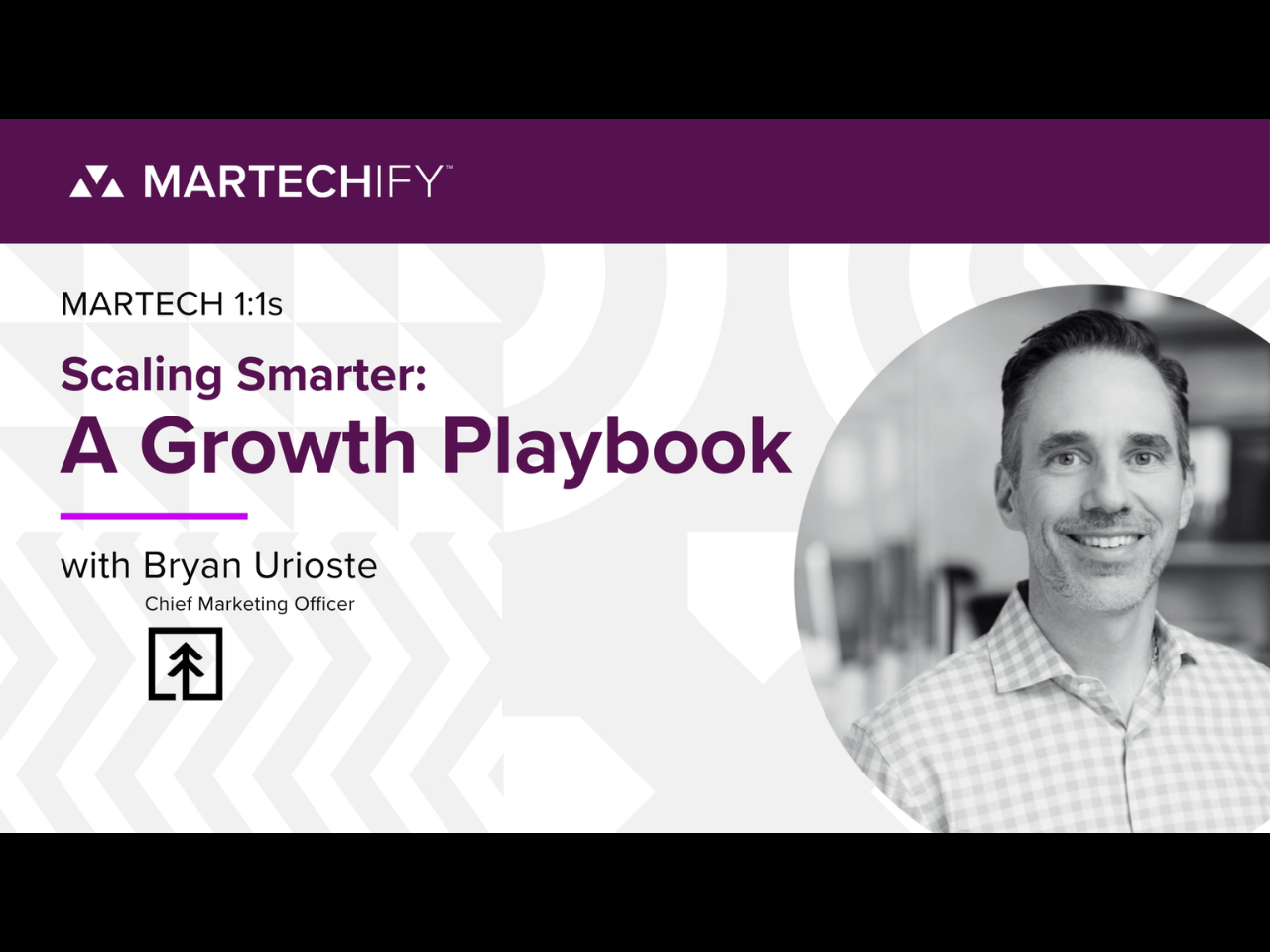How AI Is Reshaping Higher Education and the Future Workforce
- Dr. Art Markman, Senior Vice Provost for Academic Affairs at The University of Texas at Austin
- AI and Automation, Customer Experience (CX), Digital Transformation, Lead Gen / Lead Mgmt, Managing Your Career, Other Martech, Strategy and Trends
Artificial intelligence isn’t just a trend; it’s a tidal force that is transforming industries, workplaces, and learning itself. Nowhere is this more visible than in higher education. The Martechify team recently sat down with Dr. Art Markman, Senior Vice Provost for Academic Affairs at the University of Texas at Austin, to explore how AI is revolutionizing the academic experience and what that means for the next generation of marketers, technologists, and leaders.
Check out the full interview with Dr. Markman, where he discusses how AI is transforming how the next generation experiences learning. If you want to learn more about how UT Austin is incorporating AI as a tool, this is the interview for you.
Rethinking assessment in the age of AI
When ChatGPT and other generative AI tools burst into the mainstream, many faculty felt an immediate jolt: If students can generate essays and research with a prompt, how do educators verify real learning?
Dr. Markman sees this as both a challenge and an opportunity.
He noted that traditional assessment practices in higher education were already overdue for reinvention. Tools like ChatGPT are now pushing educators to reconsider how they measure knowledge and skills.
“We’re being forced to examine what it really means to demonstrate learning. Are students genuinely developing competencies, or are they just completing assignments?” he said.
Rather than relying on outdated methods like generic take-home essays, UT Austin is working to clarify why students do specific assignments in the first place. When learners see that writing a paper is about organizing thoughts, building language skills, and critical reflection, they are less likely to view AI shortcuts as an acceptable substitute.
This shift demands a cultural transformation, not just a policy update. Faculty must communicate the purpose of assignments in ways that feel relevant and motivating. It’s a parallel to marketing itself: clarity of purpose drives engagement.
Dr. Markman sees this as both a challenge and an opportunity.
He noted that traditional assessment practices in higher education were already overdue for reinvention. Tools like ChatGPT are now pushing educators to reconsider how they measure knowledge and skills.
“We’re being forced to examine what it really means to demonstrate learning. Are students genuinely developing competencies, or are they just completing assignments?” he said.
Rather than relying on outdated methods like generic take-home essays, UT Austin is working to clarify why students do specific assignments in the first place. When learners see that writing a paper is about organizing thoughts, building language skills, and critical reflection, they are less likely to view AI shortcuts as an acceptable substitute.
This shift demands a cultural transformation, not just a policy update. Faculty must communicate the purpose of assignments in ways that feel relevant and motivating. It’s a parallel to marketing itself: clarity of purpose drives engagement.
A competitive edge for recent graduates
Beyond the classroom, AI is reshaping the labor market. Entry-level marketing and digital roles are increasingly automated, from content generation to analytics dashboards, leaving new graduates worried about their value.
Dr. Markman acknowledged that automation is narrowing opportunities for entry-level talent, but he emphasized that core cognitive and problem-solving skills are more essential than ever.
“Earning a certificate in something like project management can help you get hired,” he explained, “but what sustains a career are the broader skills you build in a degree program: thinking critically, learning how to learn, communicating effectively, and solving problems creatively.”
Graduates must learn to frame questions, interpret data, and adapt continuously. These abilities are what distinguish a human professional from an algorithm—and what ensure long-term relevance.
Dr. Markman acknowledged that automation is narrowing opportunities for entry-level talent, but he emphasized that core cognitive and problem-solving skills are more essential than ever.
“Earning a certificate in something like project management can help you get hired,” he explained, “but what sustains a career are the broader skills you build in a degree program: thinking critically, learning how to learn, communicating effectively, and solving problems creatively.”
Graduates must learn to frame questions, interpret data, and adapt continuously. These abilities are what distinguish a human professional from an algorithm—and what ensure long-term relevance.
The power of early adoption and experiential learning
Interestingly, while AI poses new risks, it also unlocks tremendous possibilities. UT Austin is empowering students to become early adopters of advanced tools.
This fall, the university will roll out a platform that lets students build their own GPTs and experiment responsibly with generative AI. Beyond that, students are trained on modern tools like R for statistical analysis and have access to cutting-edge maker spaces with 3D printers and laser cutters.
“We want students to engage with these technologies directly and gain hands-on experience,” Dr. Markman said. “The goal is to foster curiosity and experimentation.”
Access isn’t limited to a select few. Any enrolled student, from an undergraduate to an adult learner in continuing education, can use these resources, provided they complete basic training.
This ethos of inclusivity and exploration is a model for institutions everywhere. In the world of martech, where new platforms and technologies emerge constantly, graduates trained to adopt technology fearlessly have a distinct advantage.
This fall, the university will roll out a platform that lets students build their own GPTs and experiment responsibly with generative AI. Beyond that, students are trained on modern tools like R for statistical analysis and have access to cutting-edge maker spaces with 3D printers and laser cutters.
“We want students to engage with these technologies directly and gain hands-on experience,” Dr. Markman said. “The goal is to foster curiosity and experimentation.”
Access isn’t limited to a select few. Any enrolled student, from an undergraduate to an adult learner in continuing education, can use these resources, provided they complete basic training.
This ethos of inclusivity and exploration is a model for institutions everywhere. In the world of martech, where new platforms and technologies emerge constantly, graduates trained to adopt technology fearlessly have a distinct advantage.
Navigating the enrollment cliff and the value of regional alignment
While UT Austin enjoys strong brand equity: “People here in Texas dress their babies in burnt orange onesies, hoping they’ll end up Longhorns,” Dr. Markman noted with a smile, many universities face enrollment declines driven by demographics and changing perceptions of higher education. To stay competitive, UT focuses on aligning its academic offerings with regional economic demands. Texas’s booming semiconductor sector and AI-driven enterprises have led to a surge in affordable master’s programs in computer science, data science, and related fields.
He described this approach simply: “We’ve built programs that serve the local economy and create pipelines to employment.”
For schools struggling to fill seats, connecting curriculum to real industry needs is a powerful differentiator.
He described this approach simply: “We’ve built programs that serve the local economy and create pipelines to employment.”
For schools struggling to fill seats, connecting curriculum to real industry needs is a powerful differentiator.
Experiential marketing in higher education
As our conversation turned to marketing, Dr. Markman shared insights that resonate with any digital strategist. Even in higher ed, brands can’t rely solely on digital campaigns or white papers to win hearts and minds.
“You have to be visible everywhere,” he said. “Think about a brand like Coca-Cola. Everyone knows it exists, but they keep advertising so it’s always top of mind.”
For universities, this omnipresence, including digital channels, billboards, and sports broadcasts, is a prerequisite. But it’s not enough on its own. Creating personal connections through campus visits, alumni engagement, and face-to-face experiences is critical.
“You can’t replace one with the other,” he added. “It’s the combination of awareness and engagement that makes a school aspirational.”
It’s a compelling reminder: in martech, brand familiarity opens the door, but emotional connection is what builds lasting loyalty.
“You have to be visible everywhere,” he said. “Think about a brand like Coca-Cola. Everyone knows it exists, but they keep advertising so it’s always top of mind.”
For universities, this omnipresence, including digital channels, billboards, and sports broadcasts, is a prerequisite. But it’s not enough on its own. Creating personal connections through campus visits, alumni engagement, and face-to-face experiences is critical.
“You can’t replace one with the other,” he added. “It’s the combination of awareness and engagement that makes a school aspirational.”
It’s a compelling reminder: in martech, brand familiarity opens the door, but emotional connection is what builds lasting loyalty.
Human thinking: The ultimate competitive advantage
As a cognitive psychologist, Dr. Markman closed with a powerful reflection. No matter how sophisticated AI becomes, understanding human behavior remains an irreplaceable skill.
“People study biology and chemistry, but they often overlook psychology,” he said. “Yet, no matter what you do, you’ll be working with other humans. The better you understand how people think and act, the more effective you’ll be.”
In an era dominated by automation, qualities such as empathy, creativity, and the ability to connect are what will define the most successful marketers and the most impactful leaders. For graduates and professionals alike, the lesson is clear: technology may be a formidable tool, but human thinking is the true competitive edge.
“People study biology and chemistry, but they often overlook psychology,” he said. “Yet, no matter what you do, you’ll be working with other humans. The better you understand how people think and act, the more effective you’ll be.”
In an era dominated by automation, qualities such as empathy, creativity, and the ability to connect are what will define the most successful marketers and the most impactful leaders. For graduates and professionals alike, the lesson is clear: technology may be a formidable tool, but human thinking is the true competitive edge.

